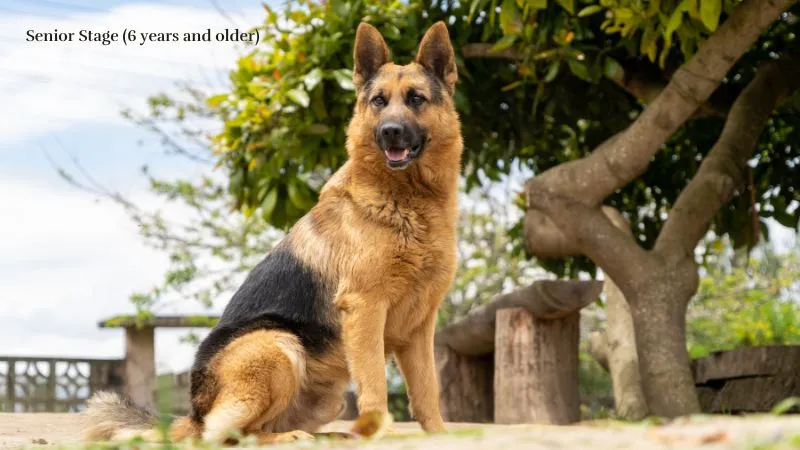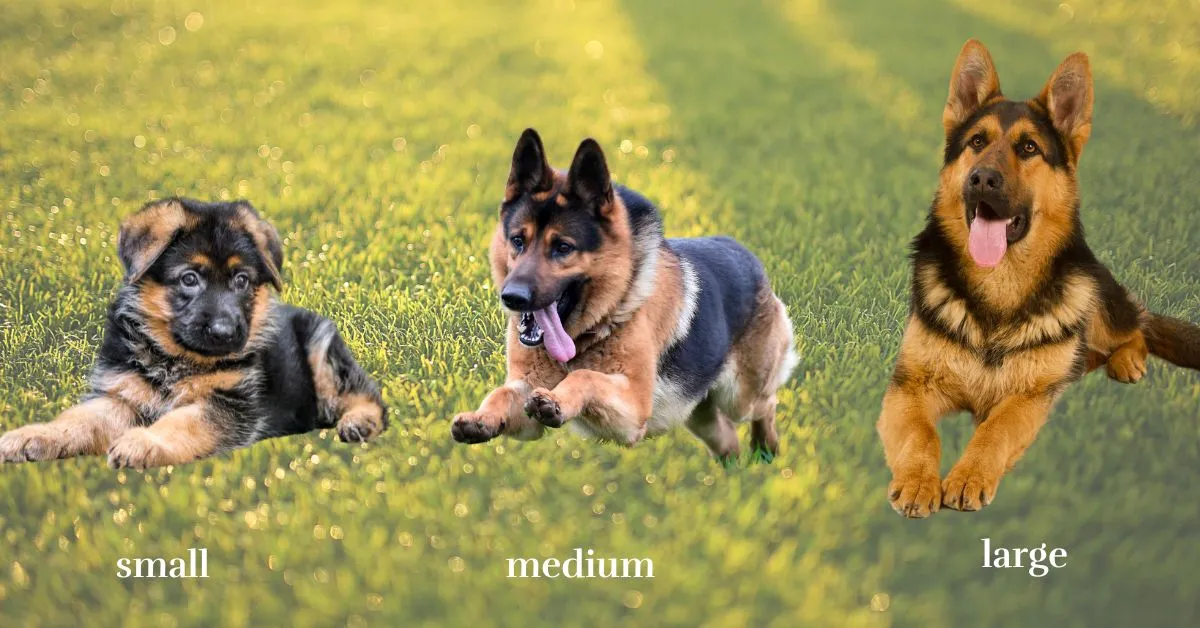As a dedicated guardian of a German Shepherd, understanding the German Shepherd growth stages has been crucial to ensuring my companion grows up healthy and strong. The growth process of these magnificent dogs is fascinating, but it comes with its set of concerns.
From their rapid growth spurts during the puppy phase to reaching their full size between 18 and 24 months, each stage requires specific attention to diet, exercise, and health monitoring to prevent growth-related issues such as hip dysplasia. Recognizing and addressing these concerns early in the German Shepherd’s growth stages can lead to a happier, healthier life for your furry friend.
Read more: German Shepherd Attacks Child
German Shepherd Growth Stages
Neonatal Stage (0-3 weeks)

During the neonatal Stage, German Shepherd puppies rely entirely on their mother for sustenance and warmth. Their eyes and ears are shut at this time, rendering them both blind and deaf.
This period is critical for developing their senses and initial motor skills. By the end of the third week, puppies begin to open their eyes, start to hear, and take their wobbly first steps.
Socialization Stage (3-12 weeks)
The socialization stage is when German Shepherd puppies become more aware of their surroundings, other dogs, and humans. From 3 weeks, they interact with their littermates and develop social skills.
Around 8 weeks is often the best time for puppies to be rehomed, as they can form strong bonds with their new families. Owners should begin training and socialization exercises to help their puppies become well-adjusted adults.
Juvenile Stage (3-6 months)
This phase is characterized by swift physical development. The German Shepherd puppies will lose their baby teeth and gain their complete set of adult teeth. It’s crucial to continue with consistent training and socialization during this period. Puppies will have lots of energy and may begin testing boundaries, making this a critical time for reinforcing discipline and establishing leadership.
Adolescent Stage (6-18 months)
Adolescence in German Shepherds can be challenging for owners as their dogs become more independent and may exhibit behaviors such as dominance and territoriality.
Although their growth rate slows down, they continue to fill out and gain muscle. Ongoing training and exercise are vital to managing energy levels and maintaining good behavior during this Stage.
Mature Stage (18-36 months)

By 18 months, a German Shepherd will have reached its full height, but it may continue gaining muscle and bulk until it is about three years old.
This is the Stage when it transitions from adolescence to adulthood. It is essential to maintain a routine that includes plenty of physical exercise and mental stimulation to keep it healthy and engaged.
Senior Stage (6 years and older)

As German Shepherds enter their senior years, they start to slow down. Their dietary and exercise needs may change, and some may develop health issues common to large-breed dogs, such as hip dysplasia or arthritis.
Regular veterinary check-ups have become even more critical in managing age-related health problems. Additionally, owners should consider adjusting their living environment to make it more comfortable for an aging dog.
Neonatal Stage (0-2 Weeks)
In the primary 0-2 weeks of life, German Shepherd dogs depend entirely on their mother’s milk, which offers essential antibodies for contamination protection. Since they can’t regulate their frame temperature, a warm, secure nesting location is vital for their survival and healthful development all through this inclined section.
Transitional Stage (2-4 Weeks)
The Transitional Stage (2-4 weeks) is a vital period for German Shepherd puppies, marked by speedy booms and milestones. They open their eyes and ears for the first time, explore their surroundings, and take tentative first steps.
This Stage additionally introduces solid meals, supplemen5ting their mother’s milk to meet their growing dietary wishes, assisting them to regulate progressively to an extra variety of food regimens.
Socialization Period (5-12 Weeks)
The Socialization Period (five to 12 weeks) is crucial for German Shepherd puppies, who are most receptive to new stories. Positive publicity to various people, animals, sounds, and environments at some point during this time shapes their responses to stimuli, assisting emotional improvement and reducing future worry or aggression. Responsible owners use this Stage to safely introduce puppies to numerous stories, building a foundation for a well-rounded, confident canine.
Juvenile Stage (three-6 Months)
The Juvenile Stage (three months) is marked by ongoing growth and cognitive improvement in German Shepherd dogs. This is an ideal time for based training, introducing instructions like “sit,” “stay,” “come,” and “heel.” Consistent, excellent training is crucial as dogs are keen to research.
Socialization remains vital, exposing them to numerous environments, animals, and those. Teething can also begin, so supplying bite toys can help ease pain and save you damaging chewing.
Adolescent Stage (6-24 Months)
The Adolescent Stage (6-24 months) marks German Shepherds’ last growth and crucial behavioral development section. They reach maturity, with a few persevering to construct muscle into their 2nd year.
Behaviorally demanding situations like testing limitations, independence, and low defiance occur every day. Patience, consistent education, and ongoing socialization are essential for this segment to help them mature into disciplined, well-adjusted adults. A balanced subject, love, and guidance approach is crucial to their successful transition to maturity.
Maturity/Adult Stage (2-eight Years)
The Maturity Stage (2-eight years) marks stability in a German Shepherd’s bodily growth and conduct, reflecting earlier education and socialization. A mature canine shows self-belief, calmness, and a strong temperament.
Regular exercising, intellectual stimulation, and routine fitness in the United States are essential for maintaining health and sharpness. This Stage strengthens the bond between canine and proprietor, constructed on mutual recognition. Constant recurring, balanced nutrition and subtle training help ensure the well-being of Shepherd at some point in its high years.
Senior Stage (8+ Years)
In the Senior Stage (8+ years), German Shepherds revel in reduced power tiers and may expand age-associated issues like arthritis, hip dysplasia, or sensory impairments. Owners need to recognize a balanced weight-reduction plan, mild exercise (mild walks, swimming), and ordinary vets take a look at-u.S.To manage fitness worries.
Adjustments to their surroundings, like ramps and orthopedic beds, help ease mobility. Mental stimulation, including puzzle toys, keeps them engaged without straining their bodily competencies.
Final Thoughts
Caring for a German Shepherd requires commitment, endurance, and know-how. However, the rewards are immense. From curious puppyhood to dignified senior years, they are dependable, intelligent, and adaptable companions.
Their development is predicated on the quality of care, education, and love they receive, growing an adventure of mutual increase and respect. Recognizing each Stage’s unique needs ensures their well-being and enriches the lives of folks who percentage their homes with them.
FAQs
How long does it take for a German Shepherd to grow to full size?
German Shepherds usually reach their full size by 18 to 24 months. However, their growth rate can vary significantly depending on factors like genetics, nutrition, and exercise. They continue to fill out and gain muscle until about 3 years of age.
How can you tell how big a German Shepherd will get?
Estimating the size of a German Shepherd depends on factors like genetics, diet, and overall health. You can look at the size of the pup’s parents as a reliable indicator. Regular check-ups with a vet, alongside a balanced diet and adequate exercise, are crucial for healthy growth.
Is a one year old German Shepherd still a puppy?
Yes, a 1-year-old German Shepherd is generally considered still a puppy. They continue to grow and mature until about 2 to 3 years of age. This period is crucial for their physical and behavioral development.
At what age do German Shepherds slow down?
German Shepherds typically begin to slow down as they reach middle age, around 7 to 8 years old. This slowing down is part of the natural aging process, impacting their activity levels and agility. Owners may notice a decrease in their dog’s enthusiasm for physically demanding activities.



